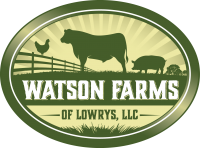Hello again from Watson Farms!
One intention we have with these newsletters is to provide valuable information that can help you stay informed about our food system. Being that you’re already some of the most informed consumers out there, that can be a daunting task, but hopefully with this issue you will learn something about our food system that you didn’t already know.
One of the largest problems in our food system today is that consumers can’t easily cut through all the marketing jargon to see how the animals are actually raised. Many consumers subconsciously give up the struggle to find truth in what they consume, and settle for labels that paint a rosy picture.
We’re glad you have decided to go beyond the labels, and in the following paragraphs I hope to remind you of five misleading claims that have likely driven you to that decision.
After all, I know how disgusted it makes me feel when I have invested my dollars in something that doesn’t live up to the claims.
Unfortunately, that is happening on a daily basis when consumers buy beef.
Let’s begin:
#1 – Grass-fed or 100% Grass-fed
First of all, Watson Farms grass-fed beef is 100% grass-fed and grass finished, and at no time in the beef animal’s life do we feed them any grains or grain by-products. We feel that the ability to convert grass to nutrient-dense beef is one of the cow’s superpowers that shouldn’t be squandered.
On the other hand, it’s important to know that much of the beef you see sold as 100% grass-fed at retail stores across the U.S is still being produced in feedlots and being fed grain by-products.
For example, many “grass-fed” beef certification programs allow for supplementation of some non-starch grain by-products like soy hulls, beet pulp, dried distillers grains, and peanut hulls.
Technically the USDA standards do not allow for feedlot finishing or feeding of grain by-products for beef that is labeled as “100% grassfed”.
However, if you review the production protocols of the largest brands that claim “100% grassfed” on their labels, you can easily see that these brands allow the supplementation of these grain by-products.
Keep in mind that there are only 16 Food Safety Inspection Services(FSIS) employees at the USDA who are responsible for verifying nearly 1 million label submissions per year. It is simply impossible for so few people to ensure the accuracy behind each label claim.
Recommendation: The bottom line is that when you see the claim 100% Grass-fed on a USDA label it cannot be trusted without visiting the actual farm.
#2 – Product of USA
This ends up being a meaningless claim because all meats that are imported from another country can legally claim “Product of USA” as long as it passed through a USDA processor.
This is one of the most egregious labeling loopholes in the food industry as it undermines your ability as a consumer to know where your food comes from.
According to a report from the Stone Barns Center, 75-78% of all grass-fed beef sold at retail is imported from overseas and can be sold as “Product of USA.” The report goes on to say that “American consumers are often not aware that they are buying imported beef.
Recommendation: Whether you are buying an online monthly home delivery beef subscription box or visiting a local grocer, ask what state their cattle are raised in.
#3 – Certified Organic Beef
The reason I include “Certified Organic” in this list is due to the fact that most of the organic beef in the US is a by-product of spent dairy cows from organic dairies that mirror industrial style production practices.
There’s been a lot written by folks like Michael Pollan on how the organic label has been taken over by the industrial food system and the dairy industry is a major offender of this takeover.
In what has been considered one of the largest fraud investigations of the organic industry, The Cornucopia Institute revealed the following photo of an 18,000 cow organic dairy operation in Stratford Texas.
The photo below represents where organic beef can come from and explains why retailers can offer this “organic” beef at prices not much more than conventional beef.
This is probably not the picture you had in mind when you saw the word Organic, right?
Keep in mind that “organically” produced beef can still be fed grain and confined to feedlots for portions of their life. Unknown to most consumers, the “organic” grain that is fed to the cattle can still be raised with chemical pesticides. You can visit the USDA’s website for a full list of approved synthetic pesticides for organic production here.
One final point, according to The Cornucopia Institute nearly half the organic corn and over 80% of the organic soybeans used for livestock feed is imported from China and former Soviet Bloc countries that have been known for high levels of commercial fraud.
#4 – Humanely Raised Beef
In recent years there has been a host of 3rd party labels that are used by brands to convince consumers that their animals were raised and cared for humanely. Unfortunately, most of these certifications do very little to improve the actual welfare conditions on the farm.
The largest animal welfare certifiers including the Global Animal Partnership, American Humane, Certified Humane and others allow for conventional feedlot cattle finishing.
For example GAP (Global Animal Partnership) is widely used by progressive grocery retailers. On the surface, their standards appear to be high. However, what most consumers are unaware of is the fact that there are up to 5 levels of GAP Certification.
While many retailers like to promote the high standards of GAP 4 and 5 approval, the majority of products that are sold only meet the lowest levels for animal care. One could argue that the higher levels exist to create a higher perceived value for the overall label claim.
Enforcing standards for animal care is very difficult as farms must carry out welfare practices daily – yet each farm is inspected only once per year at best.
#5 All-Natural vs Naturally-Grown Beef
This can be a very confusing allegation as both of these claims have very different meanings when applied to beef production practices.
The claim “All-Natural” simply means the meat was not fundamentally altered during processing or does not include any artificial ingredients. This claim has nothing to do with the farm’s production practices which means beef labeled as “All-Natural” can come from cattle that were given artificial hormones.
However, when you see the term “Naturally-Raised” it does mean the cattle were raised without the use of artificial hormones or animal by-products. Keep in mind that this claim does not exclude the use of drugs and still allows for cattle to be raised in feedlots.
Conclusion:
As the informed food buyer that you are, you probably pay attention to labels to determine the best foods for your family. Food companies, on the other hand, spend large amounts of money on consumer research to know precisely what consumers will best respond to. The product of this research then lands on their labels and better profits are the end result.
But in my opinion these large food companies have a problem. More and more consumers are digging deeper into these paper-thin labels and realizing that what really matters is the integrity of the producer and the ability to verify claims by visiting their farmer.
We intend to have many opportunities in the coming year for you to visit us and see our claims in action. Stay tuned for more some of those dates.
Thank you for diving deeper into the integrity of your food and trusting Watson Farms!
Tag us in your social media posts using our products!
We have added a page on our website that brings together all of the posts and photos from Facebook and Instagram that mention us (Facebook: @Watson Farms Pastured Meats, Instagram: @watsonfarmsbeef).
Or if social media isn’t your thing, then you can use a form on the webpage to upload your photo straight to us.
Whichever way you choose, we love seeing how our customers are using our products!
We have revamped our Referral Program!
It’s now easier than ever to Give $15 and Get $15 through our Referral Program. We don’t spend a lot of money of advertising, but rather we focus on producing products that people love and are willing to tell others about. So we depend on word of mouth to find new customers and ultimately to heal more land.
So in an effort to streamline this process we have made it easier to tell others (via email, Facebook, or Twitter) about Watson Farms. And it’s all automated on the backend, so you don’t have to rely on us to issue the store credits manually. Just head over to our Referrals Page and start sharing!
Product Spotlight
We’ve got several items to highlight this week. First, we did an inventory check on our whole broilers and determined that we have what should be a pretty strong supply until we are able to process more chickens this spring. So we’re offering them for $3.99/lb (50¢ per pound off) for a limited time. UPS customers can take advantage of our whole chicken sale as well with our 4 Whole Broiler Bundle which we have marked down 10% also!
We wanted to also point out that we recently designated some of our beef inventory toward some Quarter Beef Bundles. These quarters include a total of 14 steaks as well as 40 lbs of Ground Beef and plenty of roasts! Its a great way to stock up on grass-fed beef straight from the farm while saving some money!
Lastly, we’re still getting some very nice extra large eggs from a couple of our hen flocks. They’re feeling good in this cool weather so they give us a good many XL eggs. Take advantage of a good price and on these before we retire one of our flocks.
-
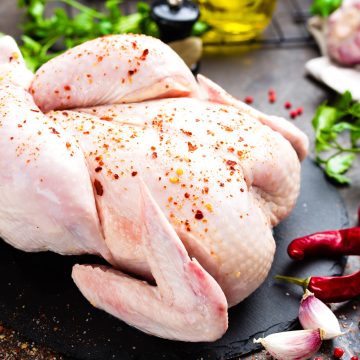 Whole Broiler$24.94 – $34.38
Whole Broiler$24.94 – $34.38 -
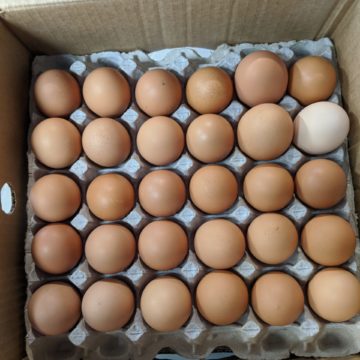 Bulk Eggs (flats)$37.50 – $83.85
Bulk Eggs (flats)$37.50 – $83.85 -
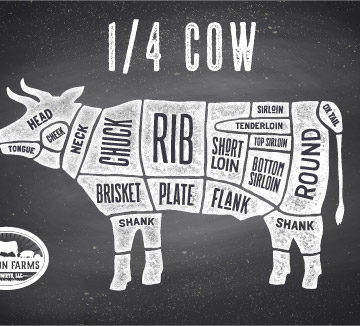 Quarter Beef Bundle$949.00
Quarter Beef Bundle$949.00 -
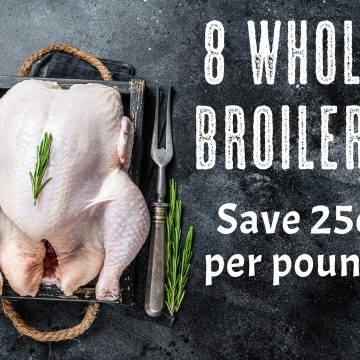 8 Whole Broilers$264.00
8 Whole Broilers$264.00 -
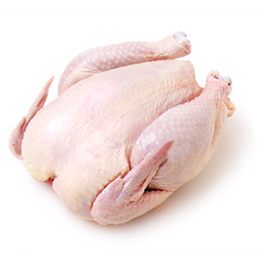 4 Whole Broilers (UPS)$139.00
4 Whole Broilers (UPS)$139.00
You can see ALL of our ON SALE products with the button below.
For some of our recommended products, check out our Featured Product Page. You might find something that you didn’t even know we had!
We re-use packaging!
We’ve seen a good response to our efforts in re-using packaging! Thanks and keep it up.
You can help us reduce our carbon footprint by returning your CLEAN egg cartons and meat boxes.
The main reason that we switched to plastic egg cartons a while back was because they are so much more durable than paper which could only be used once. They also protect the eggs much better!
So if you have some egg cartons or boxes to return, you can just place them on your porch on your home delivery day. Farm pickup customers can, of course, drop them off when you come to pick up your new order.
***We can only re-use OUR cartons or boxes. Please re-use or recycle other boxes or egg cartons elsewhere.***
Thanks for helping us re-use our packaging!
Order Deadlines and Store Hours
Charleston and Columbia Areas: 12 noon Mondays
UPS Orders: 12 noon Mondays
GSP: 12 noon on Wednesdays
Charlotte/Fort Mill/Rock Hill Areas: 12 noon Fridays
Farm Pickup: Please wait until you receive an email stating that your order is ready to be picked up (usually 1 business day from when you place your order). Farm pickup is done during store hours:
Monday, Tuesday, Thursday, Friday: 10am to 6pm
Saturday: 10am to 2pm
Closed Sunday and Wednesday
Did you know that we have a webpage that displays all the reviews we have received?
Check it out!
Check out this ⭐⭐⭐⭐⭐ review:
“I’ve been ordering from Watson’s Farm for about 3 years now. LOVE their subscription box. It’s an affordable option for our family to get most of our meat from a reputable source. I especially love the ease of farm pick up, and getting to interact face to face with our farmers. The quality of meat is everything one could hope for. It comes prepackaged, frozen, and the box is clearly labeled with each item and weight. I get the 15lb box, and on average I would say I get at least 5-6 different cuts of meat, usually from at least two animals– sometimes even all three (beef, chicken and pork) depending on the time of year. My cooking has become more flexible, and we get to try new dishes we may not have thought of before. I have never, ever had a problem with their product or service!“
We would greatly appreciate it if you would be kind enough to leave us a review. It helps first-time customers purchase with confidence.
Thanks again for being partners in this endeavor of local, pasture-raised proteins that has truly transformed our farm. We look forward to continuing this transition while serving you long into the future.
Sincerely,
The Watsons
Pasture Posts is written by Matt Watson.
